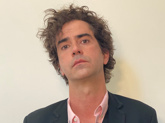Seminar’s Hamish Linklater Opens Up About His Life in the Theater and How Actors Are Like Alcoholics
If ever an actor was born to take the stage, it is Hamish Linklater. Son of revered Shakespeare teacher Kristin Linklater, he grew up on Edith Wharton's estate in the Berkshires and performed in Shakespeare & Co. productions beginning when he was eight years old. Now 35, Linklater has built a fascinating career that mixes Shakespeare’s dashing leading men with brainy types in contemporary pieces. An acclaimed actor on TV (The New Adventures of Old Christine) and off-Broadway (The School for Lies), he is finally making his Broadway debut as an insecure but talented young writer opposite Alan Rickman, Lily Rabe, Jerry O'Connell and Hettienne Park in Theresa Rebeck’s Seminar. Broadway.com chatted with the witty actor about growing up in the theater, learning about comedy from Julia Louis-Dreyfus and his long road to Broadway.
How is Seminar going?
It’s really fun. The parts are fantastic and the cast loves each other a lot, so we have a really good time.
Have you learned anything about playing a writer from being married to one [playwright/screenwriter Jessica Goldberg]?
I've been doing some writing, too. Jessica and I wrote a pilot [Prince of Motor City] for ABC that they made about four years ago. That got me started, and now I have a couple of plays—funny, tight little chestnutty plays. Doing [Seminar], I thought I should try to be “method” and I gave Alan [Rickman] one of my plays—at his request—and he was really generous and thoughtful; not like Leonard in the play at all. So all the method stuff fell on its face.
So, do you relate to Seminar more as a writer now?
Well, no. Mainly, you go through this play and take out the word “writer” and put in the word “actor.” That substitution keeps it really alive night to night because we are always asking ourselves these questions: “How serious are you?” “Do you want to be an actor or not?”
What’s it like to spar with Alan Rickman onstage?
It's fantastic. He's incredibly generous and thoughtful, on stage and off. When you see a player of that skill and experience, you just want to rise to the level of his game. The more you rise to it, the more you learn. It is that parallel of the play: Here is this writing teacher, Leonard [Rickman], with all this experience and all this stuff to offer, but you are only going to learn from him if you are as brutally honest with yourself as he is brutally honest with you. Then here is this actor with all this experience and all of this talent but you are only going to get something from working with him if you are as honest, open and free as he is.
You’re a highly accomplished off-Broadway and TV actor. Was acting on Broadway a goal for you?
I feel incredibly privileged to be on Broadway. I think I probably had a little chip on my shoulder because I hadn’t been asked before, but getting there after a long time makes it really sweet. This play, this part, is great—you'd do it anywhere, but to get paid a living wage to do it is a nice thing.
Does it frustrate you that some of your best work, including last spring’s production of The School for Lies, has been in very small theaters?
No, you just do your serenity prayer [laughs]. Being an artist is like being an alcoholic: You control the things you can and not worry about the things you can't. And I wouldn’t trade the experience I did have for anything else. It's great being in a small space and having the intimacy of that relationship with the audience—being able to see everyone falling asleep and picking their nose and trying to wake them up. The Golden is small, but between the lights and my character's glasses, I can’t see them. I can feel them, and I know when they are receiving phone calls and have a cough, but it’s not that same intimacy as off-Broadway.
You and Lily Rabe have a ton of onstage chemistry. What’s the secret to working together so well?
You know, I think it's totally [director] Dan Sullivan. When he asked me to do Merchant of Venice in Central Park, I sent him this long e-mail with questions about how he saw the character [Bassanio], and Dan wrote back this one sentence reply which was, “The only thing that matters is you go well with Lily and you’re a guy trying to get a loan.” [Laughs.] Lily and I match up really well together, and it’s always nice to be cast opposite her.
You also co-starred with Lily's mother, the late Jill Clayburgh [in The Busy World Is Hushed]. What was that like?
Jill was one of those people who made you feel incredibly special when you were on stage with her. Losing her is losing a feeling of specialness about yourself. She was just like a beam of light.
Speaking of mothers, let’s talk about your mom [Shakespeare teacher Kristin Linklater]. What are your memories of doing small roles as a kid?
I was eight when they put me on as Benedick’s boy in Much Ado About Nothing. I had two lines, and I got more notes on those two lines than anyone else in the cast. I was dreadful. I grew up in Shakespeare & Company, and the property where all the actors lived and put on the plays, so it all kind of flowed together in this haunted house that Edith Wharton built.
Did you immediately love being on stage?
I don't know about loving theater, particularly, but it was my upbringing; it was my home. So when I get to be in a play now, it feels like the world that I grew up in, and I get to be a kid as a grownup. It just feels like home.
Is it intimidating for you to do Shakespeare with your mother in the audience?
She used to be intimidating. I can’t remember exactly when she shifted into just being a proud mom from a proud mom with a lot of notes on my consonants [laughs].
Do you have a favorite contemporary Shakespearean actor?
Mark Rylance. [His work is] very light, it's always surprising, and it feels in the moment. It doesn’t feel like some dusty volume that should be left in the library. Whenever I see him on stage, I am literally skipping down the street afterwards…which is not a pretty image.
You’ve played Hamlet a couple of times, but not in New York. Is that something you would like to do?
Absolutely; that part is fantastic. It was really different both times. I did it first at 27, and the second time at 30, right after my daughter was born. I'd love to do it again and again and again. I’m also dying to play Richard III, but no one will take me seriously. I am like, “He was 33 when he died in real life. Why can’t I do it?”
Moving on to TV, what was the highlight of playing Julia Louis-Dreyfus’ brother on The New Adventures of Old Christine?
I can’t pick just one! Julia is like this aristocratic queen of comedy, with all the best qualities of the aristocracy in that she is so gracious and so giving and lovely. We all got along really well.
Any comedy lessons learned from her or Wanda Sykes?
Wanda is funny, but Julia is a technician of comedy. She knows how to make funny all the way through her body. It' not just a reading, but an attitude—how you hold your body, how you punctuate a line with your body. Her whole instrument is a comedy oboe.
Would you like to star in your own sitcom?
I would, but not a show about me. I think it's more fun to do different things and play different people. I would love to get another job, though! That would be nice. I will take employment if there is anyone out there willing to offer it to me.
Has becoming a dad [to five-year-old daughter Lucinda Rose] changed the way you work?
Yeah, I think I enjoy my work more. A kid comes into your life and you love everything more because they love everything; they are discovering everything. Everything is so fresh and new and you realize, “Why not? Why not love everything a little bit more?” I think my acting, hopefully, is getting lighter and more full of love because my life is more lighter and more full of love because my daughter… Oh my God, it's a Hallmark Q&A [laughs].
You’ve played your fair share of neurotic characters. Do you ever want to say to casting people, “I am NOT neurotic,” or are these parts fun for you?
What makes you think I'm neurotic? This is what I can’t understand. I’ve been going to my therapist about it, I’ve been going to my mother about it, trying to wrap my mind around why you’d think I’m neurotic. It doesn’t make any sense to me! Can you explain it to me? [Laughs.] Actually, I might get cast as neurotic because of growing up around a lot of Shakespeare. Neurotic people talk a lot, and so do Shakespearean people. But I would love to play a serene, strong silent type. Maybe Helen Keller or Atticus Finch?
See Hamish Linklater in Seminar at the Golden Theatre.

